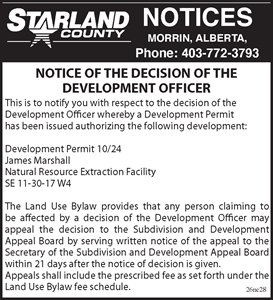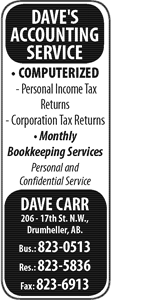
Despite negotiating a better than planed deal with the Alberta Government, pharmacists are still facing an uphill battle to make sure they are viable in the future.
The changes to the way pharmacists meet their bottom line has taken its toll already as the Hanna Value Drug Mart announced last week it would be closing its doors.
In a letter to the Hanna Herald, owner Barb Knauft, who has owned the business since 1991, informed the community she would be closing shop.
“After many stressful weeks, I have come to the decision that it is time for me to close Hanna Value Drug Mart. Our final day of business will be March 31, 2010," reads the letter. “(I) can’t thank our customers, staff, family and friends who have supported us throughout this entire time enough. I have strived to serve the community with fairness, integrity and professionalism.”
Paul Ainscough, owner of Riverside Value Drug Mart was surprised by the announcement made by Knauft.
“Any store that closes is a shock. The way the times are, the government is making promises, but they never really come across with what they are promising,” said Ainscough, who owned the Hanna store before Knauft. “It’s tough to go to the banker with promises.”
He says in Ontario and British Columbia, there have been completed studies on how much it costs to dispense a prescription, and it is between $13.50 and $14. In Alberta, the government is currently paying $10.93. While the government is planning to up the amount to $13.93 this April, this may be only a patch.
“The only problem is in a year they are going to drop it by $2, and a year later they are going to drop it by $1. After three years, you are back to $10.93. The first or second year might be alright, after that, unless things change, there are going to be a lot of problems,” said Ainscough.
Last week it was announced the government would reduce the cost of generic drugs from 75 per cent of the name brand to 56 per cent. This was off their target of 45 per cent. Ainscough says the discounts help, but they are not as reliable to count on.
“My personal opinion is we’d be better off without rebates. It would be better if we stuck with the $3 (dispensing fee) and not drop it,” said Ainscough. “The first thing they will do with rebates is start dropping them.”
He explains the idea of rebates came in the early 1990’s when the government began slashing health care. The drug companies decided to help the pharmacies by offering rebates.
“They, (the government), came out and dropped the rebates to 56 per cent, but in six months from now they could drop it in half again,” said Ainscough. “(It would be better) …if they raised your fee by $3 and kept it that way.”

























